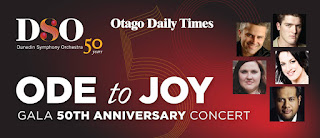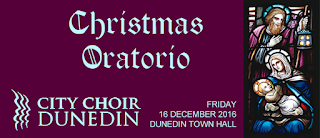Saturday 9 April 7:30 pm
Dunedin Town Hall
TECWYN EVANS, conductor
CITY CHOIR DUNEDIN
DUNEDIN SYMPHONY ORCHESTRA
Soloists: Madeleine Pierard (soprano), Claire Barton (mezzo-soprano), Jonathan Lemalu (bass)
Tecwyn Evans: Fires of Light
A selection of operatic arias and duets
Beethoven: Symphony No. 9, The Choral
Theresienmesse & Magnificat
Sunday 3 July 3:00 pm
Dunedin Town Hall
DAVID BURCHELL, conductor
CITY CHOIR DUNEDIN
DUNEDIN SYMPHONY ORCHESTRA
Soloists: Rebecca Ryan (soprano), Claire Barton (mezzo-soprano), James Adams (tenor), Matthew Landreth (bass)
FJ Haydn: Theresienmesse
CPE Bach: Magnificat
Saturday 1 October 7:30 pm
Dunedin Town Hall
Simon Over, conductor
CITY CHOIR DUNEDIN
SOUTHERN YOUTH CHOIR
DUNEDIN SYMPHONY ORCHESTRA
Soloists: Anna Leese (soprano), Martin Snell (bass)
Anthony Ritchie: Gallipoli to the Somme (world première)
Ravel: Le Tombeau de Couperin
FS Kelly: Elegy for Strings: In Memoriam Rupert Brook
Wagner: Prelude to ‘Die Meistersinger’
Ravel: Le Tombeau de Couperin
FS Kelly: Elegy for Strings: In Memoriam Rupert Brook
Wagner: Prelude to ‘Die Meistersinger’
Christmas Oratorio
Friday 16 December 7:30 pm
Dunedin Town Hall
DAVID BURCHELL, conductor
CITY CHOIR DUNEDIN
DUNEDIN SYMPHONY ORCHESTRA
SOLOISTS Lois Johnston (soprano), Claire Barton (mezzo-soprano), Iain Tetley (tenor) and Robert Tucker (bass)
JS Bach: Christmas Oratorio
Carols Live at the Otago Museum
Saturday 24 December 1:00 pm
Otago Museum
DAVID BURCHELL, conductor
CITY CHOIR DUNEDIN
City Choir Dunedin presented an hour-long programme of Christmas music at the Otago Museum.
Assistant conductor: Mark Anderson
Accompanists: Roland Storm and David Burchell
Soloist: Caroline Burchell







